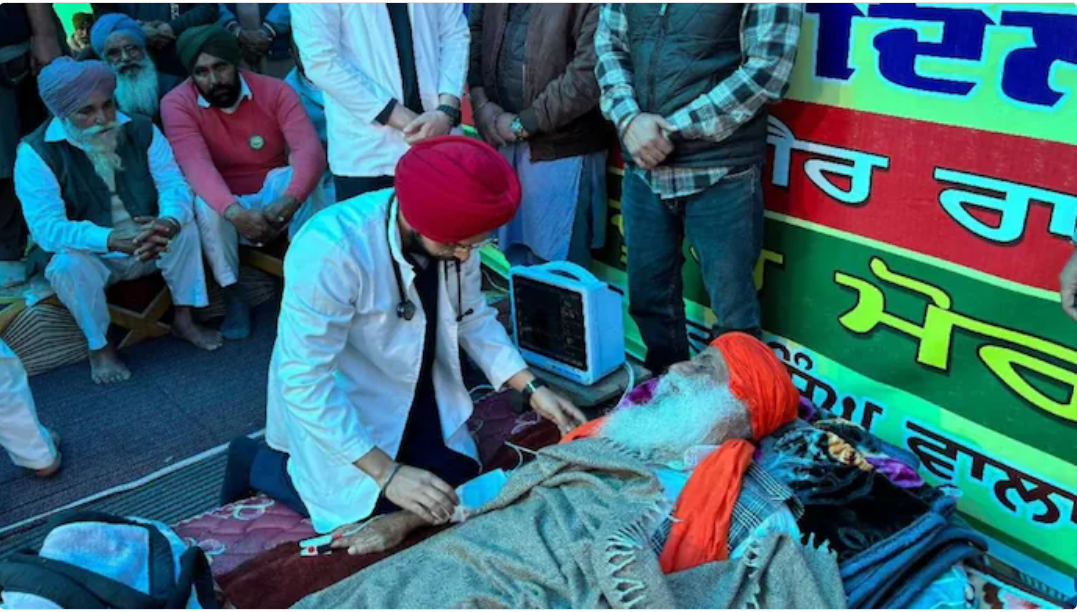
Jagjit Singh Dallewal Life at Risk Amid Prolonged Hunger Strike
Jagjit Singh Dallewal, a prominent farmer leader from Punjab, is facing a severe health crisis after having fasted for more than ten days in protest of controversial agricultural laws in India. His condition has become dire, with doctors describing his life as “hanging by a thread,” as his body shows signs of extreme malnutrition and dehydration. This alarming health deterioration has raised both national and international concern, bringing renewed attention to the ongoing farmer protests that have been a significant political issue in India.
The Hunger Strike: A Call for Justice jagjit singh dallewal
jagjit singh Dallewal hunger strike is not just a personal act of resistance but a symbolic gesture meant to amplify the voices of the thousands of farmers across India who have been protesting the three new farm laws introduced by the Indian government in 2020. These laws were seen by many farmers as being pro-corporate, undermining the Minimum Support Price (MSP) system, and leaving them vulnerable to market fluctuations without adequate protection. The fast is Dallewal attempt to highlight the distress faced by the farming community, many of whom have already faced years of financial hardship and exploitation.
Farmer leaders like Dallewal have repeatedly voiced concerns about the potential long-term negative impacts of these laws on the livelihoods of millions of small farmers, particularly in Punjab, Haryana, and Uttar Pradesh. The hunger strike was called as part of a broader movement that seeks a rollback of these laws, which has brought large numbers of farmers to the streets in a battle that has spanned years. Despite widespread opposition and numerous protests, the government has yet to concede, leaving many like Dallewal to take more drastic measures to make their voices heard.
jagjit singh dallewal A Rapidly Deteriorating Health Condition
As Dallewal continues his fast, his health has rapidly declined. Reports from his medical team indicate that he has experienced significant weight loss, dehydration, and a weakening of his vital organs. Doctors are concerned about the irreversible damage his body could suffer if the hunger strike continues any longer. Despite medical advice to break the fast, Dallewal has insisted that his struggle will not end until the government meets the demands of the farmers.
The health crisis surrounding Dallewal has sparked widespread concern, with fellow farmers, political leaders, and the general public calling for urgent intervention. Local hospitals have been put on alert, and medical professionals are warning that a delay in treatment could lead to fatal consequences. Many are urging both Dallewal and other fasting protestors to reconsider their methods, suggesting that other forms of peaceful resistance could achieve more sustainable results.
The Broader Context: Farmer Protests in India
jagjit sing Dallewal hunger strike has come to symbolize the deepening crisis within India’s agricultural sector. The protests, which began in 2020, have seen massive participation from farmers across the country, particularly in Punjab and Haryana. These protests have not only raised concerns about the farm laws but have also highlighted issues such as inadequate compensation, poor infrastructure, and insufficient government support for farmers struggling with debt.
The government’s initial resistance to the protests and their stance on the farm laws caused tensions to escalate. In response to the protests, large-scale demonstrations, roadblocks, and sit-ins have been staged, with farmers demanding an immediate repeal of the laws. Despite the ongoing protests, the government remains firm on its stance, arguing that the laws are necessary for agricultural reforms that will boost the sector’s efficiency.
However, critics argue that these laws primarily benefit large corporations and leave farmers at a disadvantage. Farmers fear that the laws will lead to the dismantling of the MSP system, causing many to be unable to sell their produce at fair prices. Dallewal and his fellow leaders have thus continued to push for a reversal of the laws, using every available means to get their message across.
The Role of Political Leadership and Public Support
As the health of leaders like jagjit singh Dallewal continues to deteriorate, the pressure on the Indian government to address the concerns of the farmers has increased. Political leaders from opposition parties have expressed solidarity with the farmers, demanding that the government engage in meaningful dialogue. Meanwhile, farmer unions have rallied behind Dallewal’s cause, calling for more protests and public demonstrations to highlight the urgency of the situation.
Public support for the farmer protests remains strong, though there is a growing sense of urgency as the toll on leaders like Dallewal becomes more apparent. Many citizens are concerned not only about the impact of the laws but also about the physical and mental strain being placed on those who are fighting for their rights. As public pressure mounts, some have suggested that the government reconsider its position and open up a wider, more inclusive conversation with farmers and their representatives.
Medical and Ethical Concerns
From a medical standpoint, Dallewal’s condition raises ethical questions about the lengths to which one should go in protest. Fasting as a form of resistance is a tactic that has been used throughout history, notably by Mahatma Gandhi, who used hunger strikes as a non-violent means of protest. However, modern medical professionals warn that prolonged fasting without intervention can lead to permanent organ damage, and in extreme cases, death.
While the right to protest is enshrined in democratic principles, the potential for irreversible health consequences raises serious concerns about the balance between non-violent resistance and personal well-being. For Dallewal, this struggle is more than just a fight against laws—it is a fight for the survival and dignity of India’s farmers. Yet, as his health continues to worsen, the question remains: how long will this suffering need to continue before meaningful change is achieved?
Conclusion
Jagjit Singh Dallewal’s life hangs in the balance as he continues his hunger strike in protest of agricultural reforms that he and countless others believe will harm India’s farmers. His case is a stark reminder of the human cost of political struggles and the sacrifices made in the name of justice. As the situation develops, the pressure on the Indian government to address the concerns of farmers grows, with the hope that Dallewal’s sacrifice will not be in vain.







